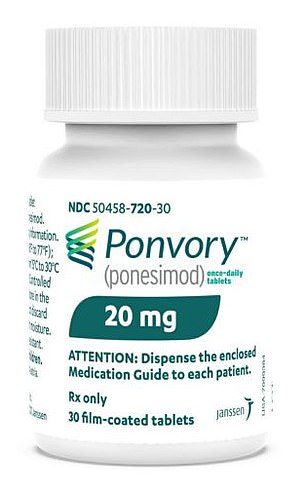
Ponesimod, sold under the brand name Ponvory, is currently approved to treat relapsing forms of MS
A multiple sclerosis (MS) drug may hold the key to treating Alzheimer’s disease, a first-of-its-kind study suggests.
Researchers recently discovered that ponesimod, a drug already approved by the Food and Drug Administration (FDA) to treat relapsing forms of MS, reduces inflammation in the brain — a key part of Alzheimer’s progression.
Neuroscientist Erhard Bieberich, the principal investigator on the study from the University of Kentucky, said: ‘We are the first to show that ponesimod is effective in a mouse model for Alzheimer’s disease.’
Mr Bieberich added that because ponesimod, which is sold under the brand name Ponvory, is already approved for MS, the process of getting the drug to Alzheimer’s patients is both cheaper and easier.
This is because the drug has already been tested for safety in humans, meaning it could make it market quicker compared to a new medication that would have to undergo the traditional FDA review process, which can take years.
It is estimated that 6.2million Americans aged 65 and older are living with the disease, a progressive and irreversible neurological disorder that affects cognitive function, memory and behavior.

Zhihui Zhu (left) and Erhard Bieberich (right) worked with fellow researchers to study the FDA-approved medication ponesimod as a potential therapy for Alzheimer’s disease

From 1906 when clinical psychiatrist Alois Alzheimer first reported a ‘severe disease of the cerebral cortex’ to uncovering the mechanics of the disease in the 1980s-90s, scientists have spent over a century trying to grapple with the brutal disease that robs people of their cognition and independence
MS is a potentially disabling disease of the brain and spinal cord in which the immune system attacks the protective covering of nerve fibers and causes communication problems between the brain and body.
The malfunctioning of the immune system causes inflammation, a major driver of many MS symptoms and Alzheimer’s disease.
In MS patients, Ponesimod, a pill taken once a day, works by calming down inflammation in the brain.
In Alzheimer’s patients, a protein called beta-amyloid peptide accumulates in the brain and disrupts brain cell function. Microglia, a type of immune cell, are needed to clear the clumps of beta-amyloid.
The researchers focused on microglia, which regulate inflammatory responses in the brain and spine, because dysfunctional microglia are connected to neurodegenerative diseases, such as Alzheimer’s.
While microglia are supposed to help clear the buildup of the beta-amyloid peptides, when they malfunction, the buildup disrupts the communication between the brain’s nerve cells and they eventually die.
Because of the similarities between Alzheimer’s and MS, the researchers wanted to study if ponesimod might stop the inflammation that drives Alzheimer’s disease.
They used mice genetically engineered to show human-like features of Alzheimer’s, as well as post-mortem samples of brain tissue donated by Alzheimer’s patients.
‘The clearance of those proteins is an important target for Alzheimer’s disease therapy,’ said Zhihui Zhu, Ph.D., first-author of the study and one of the scientists in Bieberich’s lab.
In the study, the researchers ‘reprogrammed’ microglia into cells that helped clean up the toxic proteins in the brain.
The results were ‘promising’, with signs the MS drug reduced inflammatory responses that could be responsible for Alzheimer’s, as well as encouraging microglia to eliminate protein clumps and tangles in the brain.
While the results are encouraging, the drug’s effectiveness must still be proven in humans.
The findings were published in the journal eBioMedicine last month.











